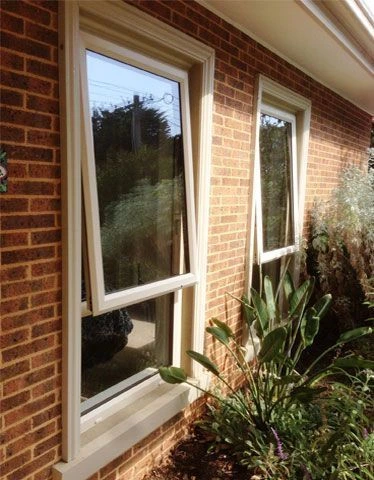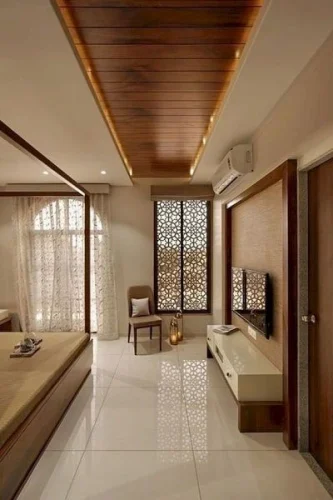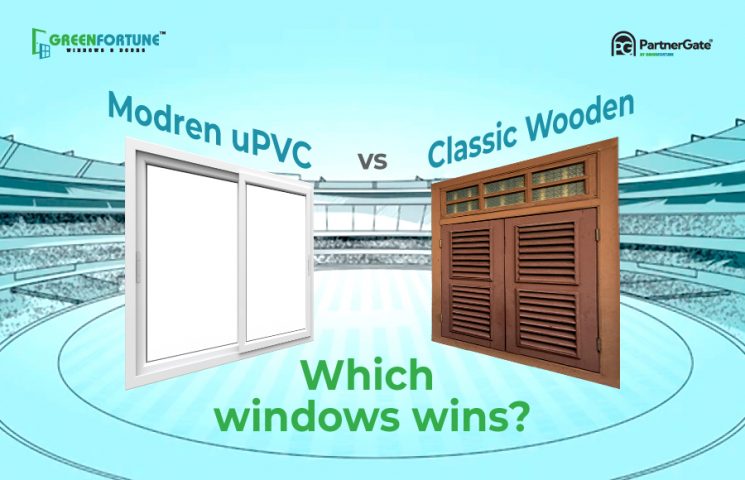
12 Types of Glass for Windows You Need to Know About
June 25, 2024
Improving the Safety of Your Home with uPVC Sliding Windows with Grill
July 1, 2024When selecting windows for your home or workplace, the choice often boils down to two popular materials: uPVC and wood.
Among the various materials available for windows, uPVC (unplasticized polyvinyl chloride) and wood stand out as popular choices, each with unique advantages and considerations. In this extensive guide about uPVC windows vs wooden windows, we will dive deep into the comparison between uPVC windows and wood windows, exploring how they differ, what benefits they offer, what potential drawbacks are, and ultimately determining which window emerges as the better choice for your place.
Also read: Why uPVC Windows and Doors Are the Perfect Choice for Modern Home Designs?
Advantages of uPVC Windows
uPVC stands for Unplasticized Polyvinyl Chloride. It is a modern building material commonly used in the construction industry. Here are some of its key benefits:
Low Maintenance: uPVC windows are a low-maintenance solution compared to wood, due to wood’s propensity to rot and flake, wooden window frames demand attention every five years, sometimes even before, with different paints and varnishes. uPVC windows would just require the occasional wipedown, you’ll be able to put your efforts into something else that awaits you.
Durability: uPVC windows are highly durable and are also resistant to weathering, corrosion, and fading. They do not rot or warp like wooden frames, and they are not susceptible to rust or corrosion like metal frames. Meaning they can last for many years requiring little to no maintenance.
Energy Efficiency: uPVC windows are highly energy-efficient, as they can prevent heat loss in the winter and keep your home cool in the summer. They are designed to be highly insulating, with multiple chambers that trap air and prevent heat transfer. This can lead to significant savings on your energy bills over time.
Versatility: You could get uPVC windows with your own preference as there are tons of customization options available and they come in a variety of styles and colours, making it easy to find the perfect match for your home’s design. They can also be customised with different glazing options, hardware, and accessories to create a unique look that complements your place.
Sound Insulation: uPVC windows offer effective soundproofing properties, They act as a barrier between your home and outside noise, helping to keep your living space peaceful and calm.
Cost-Effectiveness: While the initial cost is high, the long-term savings on maintenance and energy bills make uPVC windows a great investment.

Source: Pinterest
Advantages of Wooden Windows
Natural Beauty: Wooden windows have stood the test of time as property fashions come and go. But wood offers a timeless appeal that doesn’t date. The rich textures and grains of solid wood make wooden windows a great choice for architects, builders, and homeowners.
Insulating Properties: Wood is a poor conductor of heat so naturally it provides good thermal insulation, which helps with energy efficiency and indoor comfort.
Customization: Wooden windows are customised in terms of size, shape, and detailing to match architectural styles and preferences.
Environmental Considerations: Wood is known to be a renewable resource also, wood is a sustainable and renewable source, unlike most other materials used to produce windows such as plastic, steel, or aluminium, wood has a lower carbon footprint when compared to others.
Environmental Benefits: Wooden windows with genuine wood are highly eco-friendly. Wood is a renewable resource made of organic matter. For homeowners seeking to make their homes as green as possible, wood is an excellent option.
Historical Authenticity: In heritage or period homes, wood windows are often preferred to maintain the authenticity and historical integrity of the property.

Source: Pinterest
Comprehensive Comparison: uPVC windows vs wooden windows
Durability: uPVC windows are more durable and resistant to weather elements, moisture, and pests compared to wood. Insects are probably wood’s worst enemy, especially when termites start to take over. Also, wood is not a great option when it comes to resisting humidity or other weather elements.
Maintenance: The low maintenance requirements of uPVC windows make them super convenient . Whereas, wood not only embraces paint but needs it. Let’s learn why. Wood was once part of a living organism. If you leave it to its natural state, it will eventually rot or start to look its age. Oftentimes, untreated wooden frames swell or warp from moisture, which makes it difficult (or impossible) to raise or lower the window. It can also fade in colour if in direct sun for too many hours a day, clearly wood requires much attention and care.
Energy Efficiency: Both wood and uPVC windows are available in energy-efficient models, but uPVC windows provide better thermal insulation, which results in better energy savings and enhanced indoor comfort throughout the year.
Versatility: There is a wide range of styles, colours, and finishes to choose from. uPVC windows offer flexibility to match any architectural style or design preference, whereas wooden windows do not offer many customization options.
Environmental Impact: While uPVC production does raise some environmental concerns, its recyclability and longevity can be advantageous in that regard. Wooden windows are made from a renewable resource, and have a lower carbon footprint.
Cost-Effectiveness: Despite potentially higher initial costs, uPVC windows provide substantial long-term savings due to reduced maintenance and lower energy bills. Wooden windows are initially cheaper in some cases, but they incur higher costs over time due to maintenance and care.
Aesthetic Concerns
• Appearance: While It is true that modern uPVC windows can’t replicate the exact look of traditional wood windows, they can offer similar aesthetic appeal with a modern look.
• Customization: uPVC windows can be customised with any glazing option, hardware, or accessories. Although Wooden windows are also customizable, they do not offer as much versatility in finishes or colours.
Is It Worth Replacing Wooden Windows?
The short answer is yes. Replacing wooden windows with uPVC can save you a notable amount of cost, time, and effort. If your concern is how to keep wooden windows from rotting, you can take preventative measures, such as finding the most durable wood that resists pests and rots and maintaining it regularly. However, switching to uPVC is a cost-effective choice.
Quick Summary
Aspects | uPVC Windows | Wooden Windows |
Durability | High | Med |
Maintenance | Low | High |
Energy Efficiency | High | Med |
Aesthetics | High | Med |
Positive Environmental Impact | Med | High |
Cost | Med | Low |
Conclusion
So, who wins in this battle of “upvc windows vs wooden windows”. According to us there is a clear winner. What do you think? You can make an informed decision that aligns with your priorities for comfort, efficiency, and long-term value. Whether building a new home or renovating an existing one, choosing uPVC windows will ensure a practical and stylish solution that upgrades the beauty and functionality of residential spaces.
For more information on uPVC windows and how they can transform your home or workplace, contact GreenFortune today.










